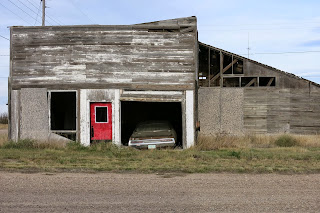I met him
in the Dutch Store, which he founded when he came to Canada Winnipeg Gouda Holland Delft Northern provinces Netherlands Friesland , as son of a poor labourer’s
family. He has illustrated this with his own pen drawings, and that is the
reason why I would like to meet him. I wonder if there are any similarities
with my own father, who has also written a book about his youth as the son of a
poor fisherman, an autobiography which he embellished with his own drawings and
watercolours.
pictures of a ghost town
An abandoned old timer
 |
| The former general store |
In the shop
there is a marvellous book on display, the latest one by Marten Posthumus, a
fat tome with drawings of ghost towns, barns, grain elevators and small towns
in Manitoba Saskatchewan
Badlands; Big Muddy River
I have just travelled with dear friends through this
part of Saskatchewan Manitoba Badlands (556) and the wide open grasslands,
where the winds blow freely across the treeless prairies. A land which seems
too barren and wild to cultivate. A land with its own beauty of undulating
grass in an ever changing pattern of pastel colours, with grasses turning
orange in autumn. When the sun slants
through the grasslands, they look like burnished gold. In some places there is
arable land, with ripe corn rippling in the wind.
 |
| Badlands |
Big Muddy River
orange grasses and ranchland
Some of the
old grain elevators are still in use, others abandoned like so many other
buildings, the paint peeling, the place names fading. With the dismantling and
disappearance of those old grain elevators, the small towns have vanished, the
elevators being the heart of the towns, the reason for their existence. Grain
is now stored in modern, much bigger and uglier elevators, and everything is
done on a grander scale, so the towns are dying.
The book
which is on display captures the sadness of lost dreams, mourning and honouring
a vanishing past. It pays homage to the hardship of the settlers who tried to
cultivate this land under difficult circumstances, battling with the forces of
nature, the climate, the land, the barren winters and the heat and drought of
summer, the wild animals. As everything was built of wood, in 50 years time
there will be no trace left of those villages, as if they never were.
Some old grain elevators
an empty land
Part of the
Dutch store has small tables and chairs and serves as a coffee shop and
lunchroom. Apart from typically Dutch food, such as “kroketten” one can also
buy soup, a BLT or a Rueben sandwich, which is American: pastrami and
sauerkraut on bread. To my surprise the former owner of the shop, the author of
the book on display, enters the shop. I am told he comes to the shop every day
to meet people he has known for as long as his shop exists. We start talking
and there is an immediate rapport. Posthumus reminds me so much of my father.
He was widowed a few years ago but has this attitude which I recognize, thankfulness
for every new day, a love of the natural world and an eye for beauty. He still
draws and drives around to forgotten towns and homesteads with his sketchbook to
record what he sees before it gets lost forever. Like my father, he admires the
hand of the Creator in the wonders of nature. His background is Dutch Reformed,
as is mine and my father’s. So there is this feeling of knowing each other, of
finding a soul mate, in spite of the differences in age and living conditions.
We talk about his book, and he tells me a book about Friesland is going to be published soon. He and
his son have just come back from a visit to the Netherlands Friesland , which he thinks it will be his
last. I wonder how this shop will change after his death. His son was born in Canada
I buy his
book as a present for my friends, and he signs it for me. When I say goodbye to
him, it is as if I say goodbye to my father.
It is one
of the more memorable and meaningful meetings during this trip through Canada






.JPG)
.JPG)
.JPG)
Beautiful and such a special meeting with the author.
ReplyDeleteInteresting that Frieslanders would settle in such arid country- tough people and a harsh environment in both places though.
They had no idea where they would end up. Canada was the promised land. Some immigrants went back within one or two years, but Posthumus said that once you had children it was best to stay and make the most of it. And he came from a poor background, so hoped to do better in Canada.
ReplyDeleteMarten en Sietske wiene trochbiters...! rp
ReplyDelete